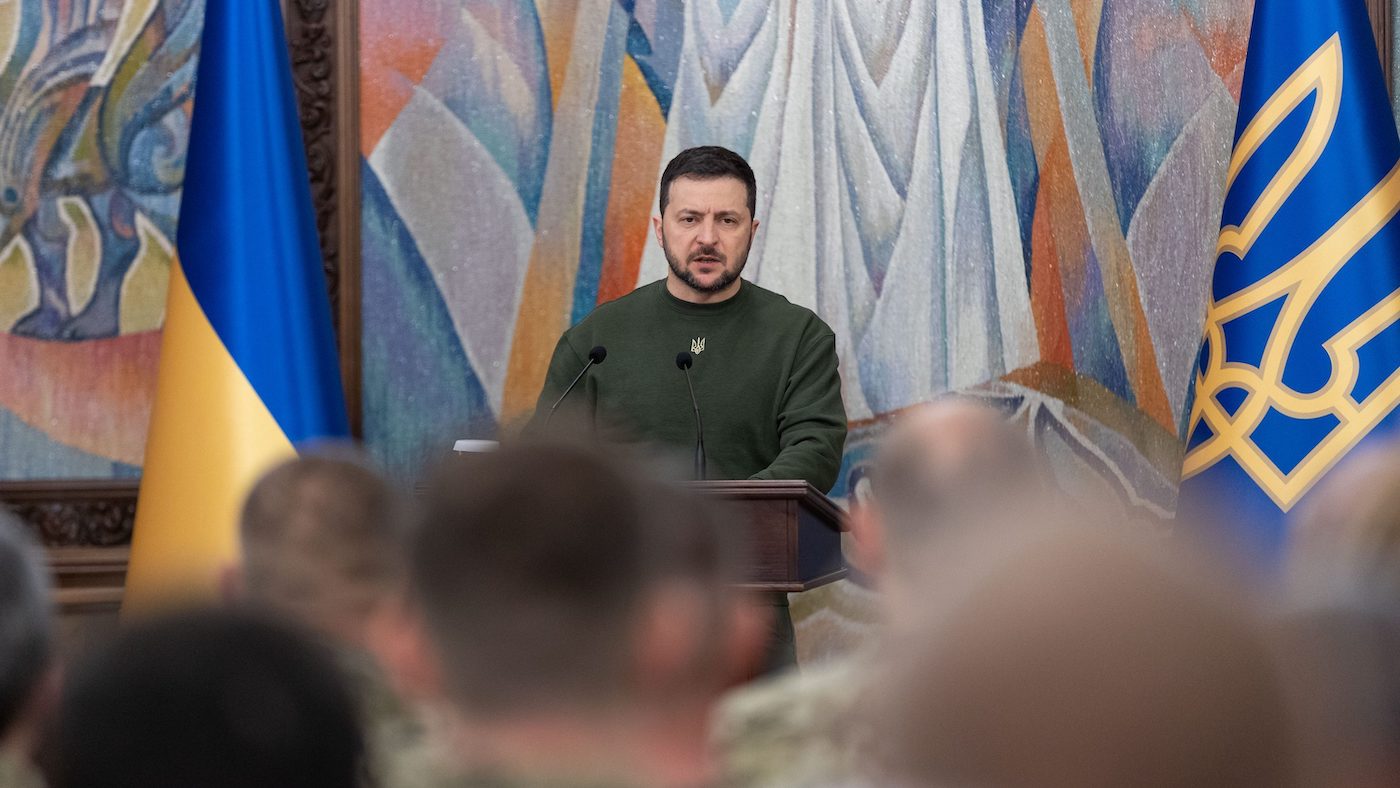Can landmark Zelenskyy visit to Washington change course of Ukraine war?
Ukrainian president will meet with US President Joe Biden before addressing members of Congress

A free daily email with the biggest news stories of the day – and the best features from TheWeek.com
You are now subscribed
Your newsletter sign-up was successful
Ukrainian President Volodymyr Zelenskyy arrives in Washington today for his first foreign trip since the Russian invasion.
With 300 days having passed since the war began, Zelenskyy will land in the US on Wednesday to meet President Joe Biden and address Congress. The details of the trip were only revealed once Zelenskyy was on his way to Washington DC. The news was “so tightly held” that “many senior officials didn’t know” about the visit, said ITV News.
While Zelenskyy has welcomed a number of allied leaders to Kyiv since the beginning of the war, his trip to the White House underscores the importance of US support when it comes to Ukraine’s progress so far against Russia. The visit comes hot on the heels of a further $2bn (£1.6bn) of military aid to the country pledged by President Biden.
The Week
Escape your echo chamber. Get the facts behind the news, plus analysis from multiple perspectives.

Sign up for The Week's Free Newsletters
From our morning news briefing to a weekly Good News Newsletter, get the best of The Week delivered directly to your inbox.
From our morning news briefing to a weekly Good News Newsletter, get the best of The Week delivered directly to your inbox.
But Zelenskyy will also be using the trip to shore up extended support that could help deliver a quicker victory against Russia. Both Biden and Zelenskyy will be keen to “woo the incoming Congress”, narrowly controlled by the Republicans, however, “expect a stand-off” between the two over the types of weapons the US can provide to Ukraine, said Politico.
What did the papers say?
Zelenskyy heads to Washington with one of the “biggest requests” of the war so far, but he “might not get the answer he wants”, said Politico.
Kyiv is seeking “more advanced weapons” from the US that can hit Russia at long range, potentially stifling attacks. An unnamed source told Politico that the Ukrainians were seeking “long-range Army Tactical Missile Systems, or ATACMS, and Grey Eagle and Reaper drones”.
The US was not “ready to budge”, fearing that sending long-range missiles could be a precursor to “Putin using potentially even more lethal weapons inside Ukraine”. President Biden remains committed to not being “drawn into an active war with Russia on Ukraine’s behalf”, said The New York Times (NYT). Ukraine will however receive a “highly sophisticated Patriot missile battery” as part of the latest assistance package, providing “far better defences against air attacks”.
A free daily email with the biggest news stories of the day – and the best features from TheWeek.com
While Biden’s support for Ukraine is unwavering, both he and Zelenskyy will now face “resistance in Congress”, the NYT said, as some Republicans “repeatedly opposed previous packages”.
Those in support are working to push a $40bn (£33bn) aid bill through Congress this week, and the presidents hope their meeting “pre-empts political complications that neither man wants”, wrote James Matthews at Sky News. President Biden’s “big sell” to aid sceptics is the “long-term strategic benefit of a weakened Russia” with the US “strengthened by leadership”.
What next?
Zelenskyy “knows the clock is ticking”, wrote Tom Nichols in The Atlantic. He not only needs the aid for weapons but for Ukraine’s “people to survive as they face a harsh winter of violence”.
He will face a “divided Congress” and his presence “will help remind people”, Nichols wrote, “that this is not some esoteric foreign-policy tangle, but a brutal, bloody human contest between democracy and authoritarianism”.
It may not be only Americans he needs to convince, with the potential for similar views to be “taking hold in parts of Europe”, wrote Roger Boyes in The Times, with “stark” choices to be made this winter.
Rishi Sunak’s “audit” of the UK’s assistance to Ukraine signals that “British sympathies are waning at a time of inflation, industrial unrest and domestic anxiety”. This is what “Putin is counting on”, as he waits “for us to fall out of love with Zelenskyy”. The West “can’t do him that favour”, added Boyes. Zelenskyy’s “fight is a fight for the future of the international community”.
However, it may be America’s resolve in the conflict that could inform the length of “Putin’s political survival”, said Stephen Collinson at CNN. The Russian president is “betting the West’s commitment will eventually ebb” and has indicated he is in for the “long haul”.
That’s why “if the West wants Russia to lose this war, it will need to do much more,” wrote Dominic Waghorn at Sky News, with Ukraine’s allies currently providing “just enough weapons to continue this war, but not to finish it”.
Zelenskyy “knows there are grumblings” and his visit to Washington is the chance to “say he needs more help”. Failing to help, Waghorn added, will put the “freedom they say they value so much in peril, and not just in Ukraine”.
Richard Windsor is a freelance writer for The Week Digital. He began his journalism career writing about politics and sport while studying at the University of Southampton. He then worked across various football publications before specialising in cycling for almost nine years, covering major races including the Tour de France and interviewing some of the sport’s top riders. He led Cycling Weekly’s digital platforms as editor for seven of those years, helping to transform the publication into the UK’s largest cycling website. He now works as a freelance writer, editor and consultant.